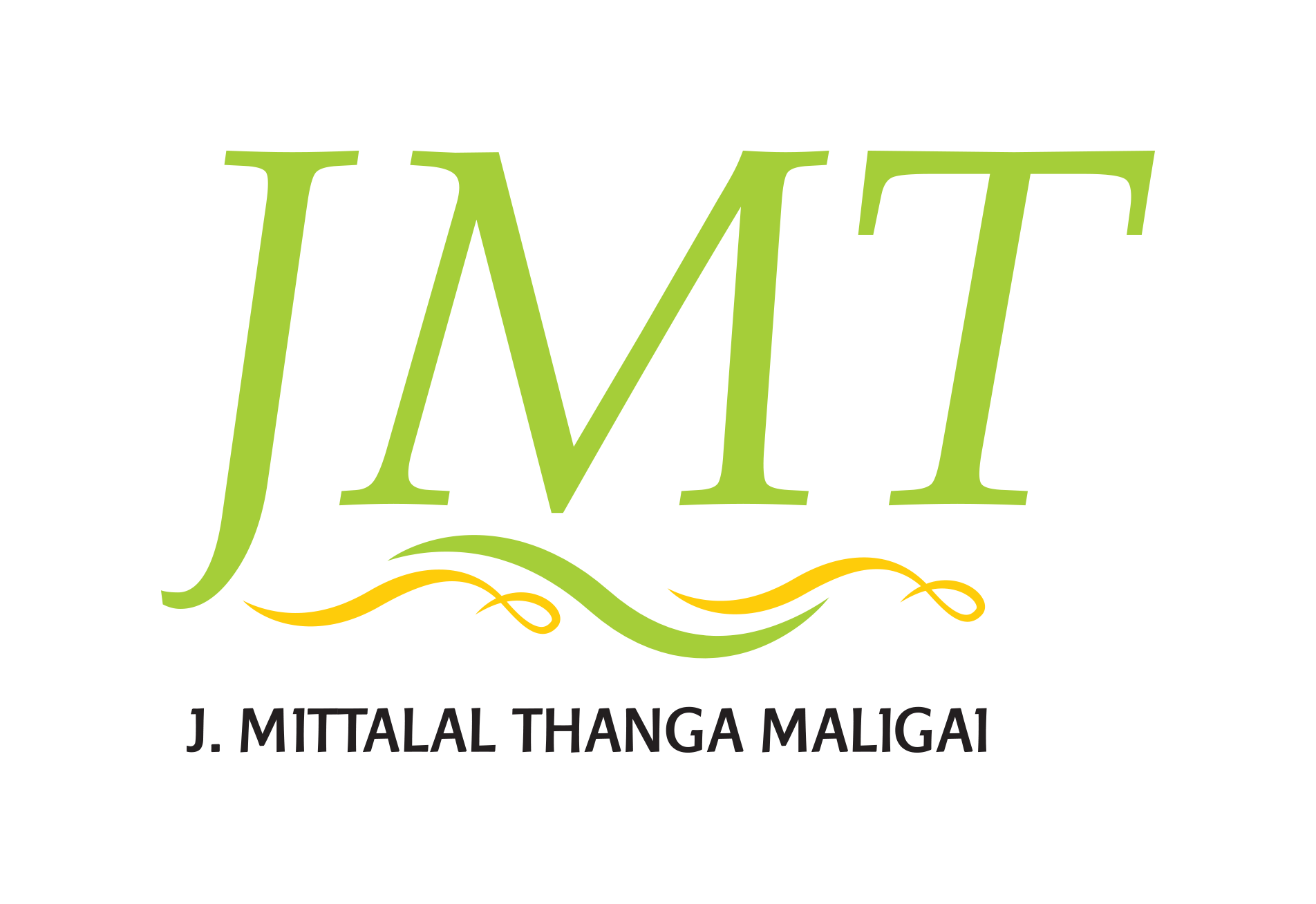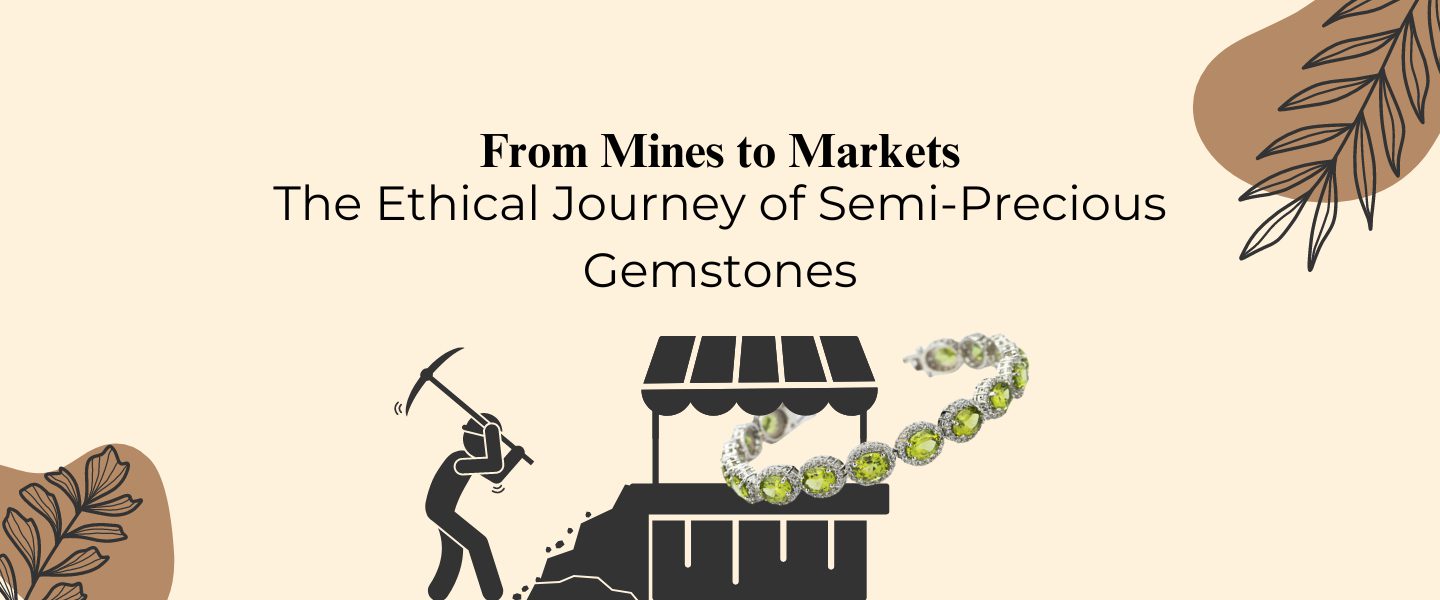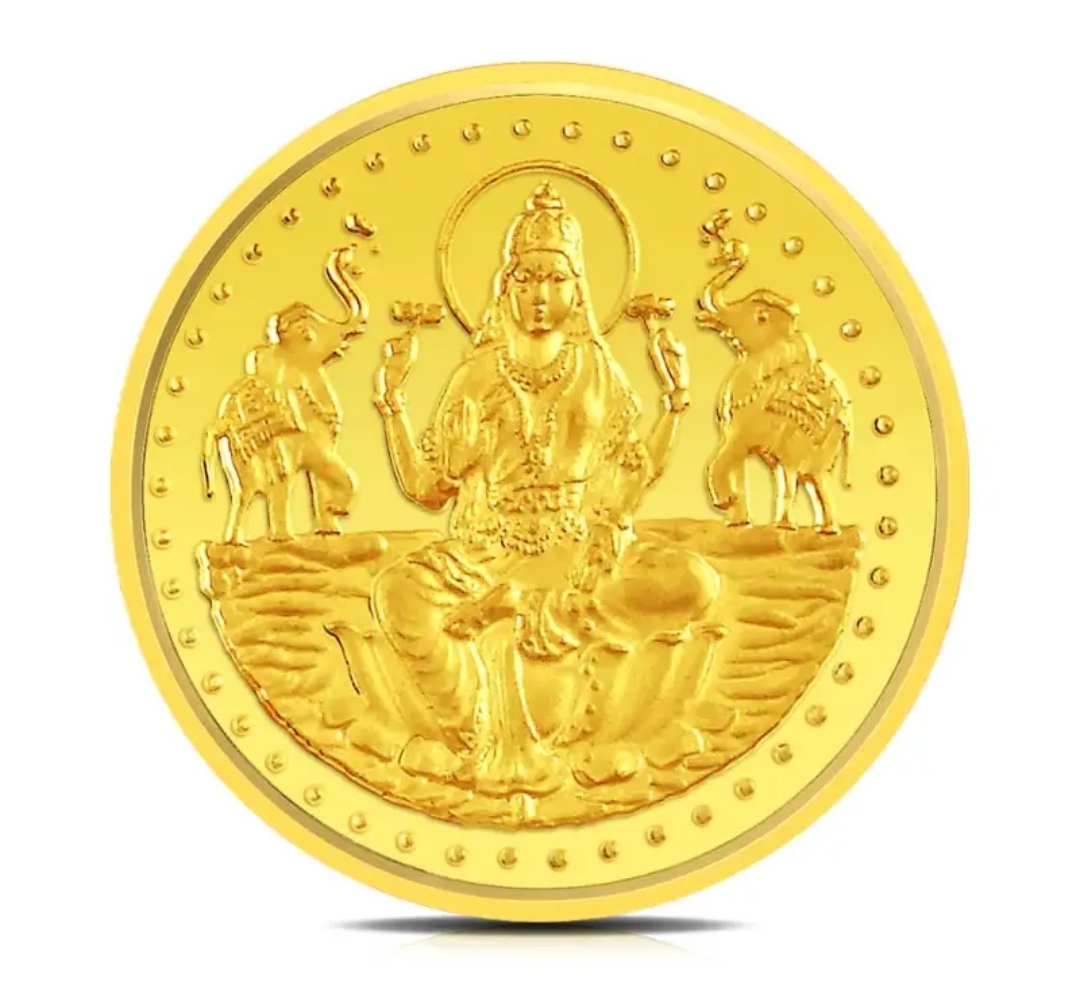Introduction
In the world of jewellery, the allure of semi-precious gemstones is undeniable. Their vibrant colours, unique patterns, and the stories they carry from deep within the Earth have captivated people for centuries. However, the journey these gemstones take from the mines to the markets is as complex as it is fascinating. As consumers become more conscious of the ethical implications of their purchases, the need for transparency and responsibility in the gemstone industry has never been greater.
At Varnium by JMT, we are committed to ensuring that our gemstones are not only beautiful but also ethically sourced. In this blog, we will explore the ethical journey of semi-precious gemstones, from the mining practices used to extract them to the markets where they are sold. We will discuss the challenges and advancements in ethical sourcing and how these practices impact the communities involved and the environment.
The Origins of Semi-Precious Gemstones: Understanding the Mining Process
The journey of a semi-precious gemstone begins deep within the Earth, where natural processes over millions of years have created these stunning stones. Extracting these gems from the ground is the first step in their journey to becoming part of a piece of jewellery.
- Mining Methods: Traditional and Modern Approaches Semi-precious gemstones are extracted using various mining methods, each with its own environmental and ethical considerations. The two primary methods are artisanal mining and large-scale industrial mining.
- Artisanal and Small-Scale Mining (ASM): This method involves small groups of miners, often in remote areas, using basic tools to extract gemstones from the earth. ASM is a labour-intensive process and is often the primary source of income for local communities. While it can be less environmentally invasive than large-scale mining, it also poses significant challenges, including unsafe working conditions, lack of proper equipment, and minimal regulation.
- Large-Scale Industrial Mining: In contrast, large-scale industrial mining involves significant machinery and technology to extract gemstones on a much larger scale. While this method can be more efficient and less labour-intensive, it often has a more substantial environmental impact, including deforestation, soil erosion, and water pollution. Moreover, industrial mining can lead to the displacement of local communities and conflicts over land rights.
- Both methods present ethical challenges, from environmental degradation to labour rights abuses. Ensuring ethical practices in the mining process requires a commitment to sustainable and responsible methods that prioritise the well-being of both people and the planet.
- Environmental Impact: Striking a Balance Mining for semi-precious gemstones, like any other form of mining, can have significant environmental impacts. The extraction process can disrupt ecosystems, lead to deforestation, and cause soil erosion. Additionally, the chemicals used in some mining processes can contaminate local water sources, affecting both wildlife and communities.
- However, the industry is increasingly recognizing the importance of minimising its environmental footprint. Sustainable mining practices, such as reducing waste, rehabilitating mined land, and using environmentally friendly technologies, are becoming more common. These practices aim to strike a balance between meeting the demand for gemstones and preserving the environment for future generations.
Ethical Challenges in the Gemstone Industry
The journey from mines to markets is fraught with ethical challenges that affect the entire supply chain. Addressing these issues is crucial to ensuring that the gemstones we wear are not only beautiful but also responsibly sourced.
- Labor Rights and Fair Wages One of the most pressing ethical issues in the gemstone industry is the treatment of workers in the mining sector. In many parts of the world, miners work in dangerous conditions, often without adequate safety measures, fair wages, or access to basic necessities. Child labour is also a significant concern in some regions, where children are employed in hazardous mining activities instead of attending school.
- Promoting fair wages and safe working conditions is essential to creating a more ethical gemstone industry. This includes providing miners with the necessary tools and training to work safely, ensuring they receive fair compensation for their labour, and supporting initiatives that keep children out of mines and in school.
- Conflict Gemstones: Avoiding the Trade of Blood Gems The term “conflict gemstones” refers to gemstones that are mined in war zones and sold to finance armed conflict against governments. While this issue is more commonly associated with diamonds, it can also affect the trade of semi-precious gemstones. The presence of conflict gemstones in the market poses a significant ethical dilemma, as their sale can contribute to human rights abuses and prolonged violence in affected regions.
- To combat this, the gemstone industry has implemented measures such as the Kimberley Process Certification Scheme (for diamonds) and similar initiatives aimed at ensuring that gemstones are conflict-free. Consumers are encouraged to seek out gemstones with certifications that guarantee they have not contributed to conflict or human rights abuses.
- Supply Chain Transparency: From Mine to Market Transparency in the supply chain is critical to ensuring that gemstones are ethically sourced. However, the gemstone supply chain is often complex and opaque, with stones passing through multiple hands before reaching the final consumer. This lack of transparency can make it difficult to verify the ethical origins of a gemstone.
- Efforts to increase supply chain transparency include traceability programs that track gemstones from the mine to the market. These programs use documentation, blockchain technology, and other tools to provide consumers with information about the origin of their gemstones, the conditions under which they were mined, and the steps taken to ensure ethical practices throughout the supply chain.
The Role of Certification and Standards in Ethical Gemstone Sourcing
To address the ethical challenges in the gemstone industry, various certification programs and standards have been developed. These initiatives aim to promote responsible mining practices, protect workers’ rights, and ensure environmental sustainability.
- Fair Trade Gemstones: Promoting Ethical Sourcing Fair Trade certification is a globally recognized standard that ensures products are produced under fair and ethical conditions. While Fair Trade is more commonly associated with products like coffee and chocolate, it has also been applied to the gemstone industry. Fair Trade gemstones are sourced from mines that adhere to strict standards regarding labour rights, environmental protection, and community development.
- By purchasing Fair Trade gemstones, consumers can support ethical mining practices and contribute to the well-being of mining communities. These gemstones often come with documentation that verifies their ethical origins, providing peace of mind for socially conscious consumers.
- Responsible Jewellery Council (RJC): Setting Industry Standards The Responsible Jewellery Council (RJC) is an international organisation that sets standards for responsible business practices in the jewellery and gemstone industry. The RJC’s Code of Practices covers a wide range of ethical issues, including human rights, labour practices, environmental impact, and product disclosure.
- Members of the RJC are required to undergo regular audits to ensure they comply with these standards. By choosing to work with RJC-certified suppliers, jewellery brands like Varnium by JMT can ensure that the gemstones they use are sourced responsibly and ethically.
- Blockchain Technology: Revolutionising Traceability Blockchain technology is emerging as a powerful tool for increasing transparency in the gemstone supply chain. By creating a digital ledger that records every transaction along the supply chain, blockchain allows for the traceability of gemstones from the mine to the final consumer.
- Blockchain technology can help prevent fraud, reduce the risk of conflict gemstones entering the market, and provide consumers with verifiable information about the origin and ethical sourcing of their gemstones. As this technology continues to evolve, it has the potential to revolutionise the gemstone industry by making supply chains more transparent and accountable.
The Impact of Ethical Gemstone Sourcing on Communities
Ethical gemstone sourcing is not just about protecting the environment and ensuring fair labour practices; it’s also about supporting the communities involved in mining. When done responsibly, gemstone mining can have a positive impact on local communities, providing them with economic opportunities and resources for development.
- Empowering Local Communities Ethical gemstone sourcing initiatives often prioritise the empowerment of local communities. This can include providing education and training programs, investing in local infrastructure, and supporting community development projects. By creating economic opportunities in mining regions, these initiatives help lift communities out of poverty and promote long-term sustainability.
- Additionally, ethical sourcing practices often involve consulting with local communities and respecting their land rights. This helps prevent conflicts over land use and ensures that mining activities are conducted in a way that benefits the community as a whole.
- Supporting Sustainable Development Sustainable development is a key component of ethical gemstone sourcing. This involves balancing the economic benefits of mining with the need to protect the environment and ensure the well-being of future generations. Sustainable development initiatives in the gemstone industry may include efforts to reduce the environmental impact of mining, rehabilitate mined land, and promote alternative livelihoods for communities.
- By supporting sustainable development, the gemstone industry can contribute to the long-term prosperity of mining communities and help preserve the natural resources that are essential to their way of life.
The Role of Consumers in Promoting Ethical Practices
Consumers play a crucial role in promoting ethical practices in the gemstone industry. By making informed choices and supporting brands that prioritise ethical sourcing, consumers can drive positive change and encourage the industry to adopt more responsible practices.
- Asking the Right Questions One of the most effective ways for consumers to promote ethical practices is by asking questions about the origin of the gemstones they purchase. This includes inquiring about the mining practices used, the treatment of workers, and the environmental impact of the gemstone. By demanding transparency and accountability from retailers, consumers can help ensure that the gemstones they buy are ethically sourced.
- Supporting Ethical Brands Consumers can also support ethical practices by choosing to buy from brands that are committed to responsible sourcing. Brands like Varnium by JMT, which prioritise transparency, sustainability, and ethical sourcing, offer consumers the assurance that their gemstones have been sourced responsibly.
- By supporting ethical brands, consumers can contribute to the demand for ethically sourced gemstones and encourage the industry to adopt more sustainable and responsible practices.
How Varnium by JMT is Leading the Way
At Varnium by JMT, we are committed to leading by example in the pursuit of ethical gemstone sourcing. Our dedication to responsible practices is reflected in every aspect of our business, from the selection of gemstones to the final design of our jewellery.
- Transparency and Traceability We prioritise transparency and traceability in our supply chain, ensuring that our gemstones are sourced from reputable suppliers who adhere to ethical standards. Our commitment to transparency allows us to provide our customers with detailed information about the origins of their gemstones, including the mining practices used and the steps taken to ensure ethical sourcing.
- Sustainable Practices Our commitment to sustainability extends beyond the sourcing of gemstones. We strive to minimise our environmental impact through responsible manufacturing practices and by supporting initiatives that promote environmental conservation. We are dedicated to reducing waste, conserving resources, and promoting sustainable development within the communities we work with.
- Fair Labor Practices Ensuring fair labour practices is a core principle of our business. We work closely with our suppliers to ensure that all workers involved in the gemstone supply chain are treated with respect and receive fair compensation for their labour. We support initiatives that promote safe working conditions and advocate for the rights of workers in the mining sector.
- Community Engagement We believe in the importance of supporting the communities that are integral to the gemstone supply chain. Our efforts include investing in community development projects, providing educational opportunities, and supporting local initiatives that enhance the well-being of mining communities. By engaging with and empowering these communities, we contribute to their long-term prosperity and sustainability.
Final Thoughts: The Ethical Impact of Your Jewellery Choices
Choosing ethically sourced gemstones is not just about making a responsible purchase—it’s about supporting a movement towards a more sustainable and equitable industry. As consumers, we have the power to drive change by demanding transparency, supporting ethical brands, and making informed choices.
At Varnium by JMT, we are proud to be part of this movement and to offer our customers jewellery that reflects our commitment to ethical sourcing. We invite you to join us in celebrating the beauty of semi-precious gemstones while also honouring the principles of responsibility and integrity.
By choosing Varnium, you are not only acquiring a piece of exquisite jewellery but also contributing to a positive impact in the gemstone industry. Together, we can ensure that the journey of each gemstone—from the mines to the markets—is marked by ethical practices, respect for the environment, and a commitment to the well-being of communities.
Thank you for supporting Varnium by JMT and for being a part of our mission to make a difference in the world of gemstones. Your choice matters, and we are grateful for the opportunity to share our dedication to ethical sourcing with you.


